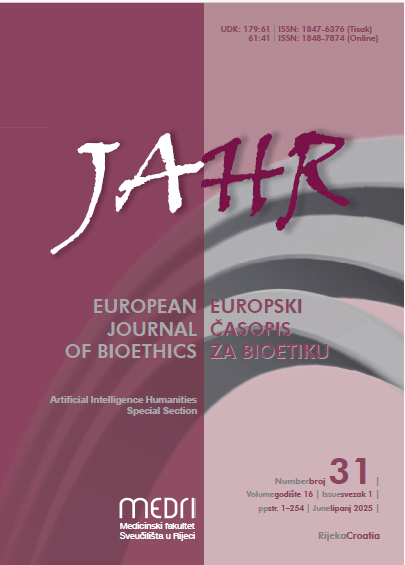Moralna filozofija Stjepana Zimmermanna
od spekulativne teorije prema življenoj praksi
Keywords:
Stjepan Zimmermann, moralna filozofija, praksa, teizam, ateizam.Abstract
https://doi.org/10.21860/j.16.1.6
Ovaj rad, uz uvod i zaključak, podijeljen je na tri dijela. U prvom dijelu ukratko se izlažu biografski i bibliografski podatci hrvatskog filozofa Stjepana Zimmermanna (Virovitica, 24. prosinca 1884. – Zagreb, 13. travnja 1963.). U drugom dijelu predstavlja se Zimmermannova teistička filozofska pozicija. Zimmermann vrlo jasno u svojim filozofskim radovima zastupa kršćanski teistički nazor na život, a iz toga filozofskog nazora onda posljedično izvodi i daljnje korake za život pojedinca. O čovjeku i njegovu životu, odnosno o čovjekovoj egzistenciji kao pojedincu i kao onome koji živi među drugim ljudima, filozof Zimmermann promišlja u kontekstu filozofije života. U trećem dijelu rada izlaže se Zimmermannova moralna filozofija, koja obuhvaća i teorijsku i praktičnu stranu. Prema teističkom pogledu na moral Bog je vrhovna norma moralnosti, a osobni moralni život u svojoj biti nije ništa doli usavršavanje u Bogu, tj. osoba se sjedinjuje s Bogom, koji je vrhovno mjerilo moralne dobrote. Zaključak je rada da Zimmermann ne smatra nevažnim živi li pojedinac moralnim ili nemoralnim životom te da njegov život ima utjecaj i na njega osobno i na društvo u cjelini.
Downloads
Published
Issue
Section
License
Authors who publish with this journal agree to the following terms:
- Authors retain copyright and grant the journal right of first publication with the work simultaneously licensed under a Creative Commons Attribution License that allows others to share the work with an acknowledgement of the work's authorship and initial publication in this journal.
- Authors are able to enter into separate, additional contractual arrangements for the non-exclusive distribution of the journal's published version of the work (e.g., post it to an institutional repository or publish it in a book), with an acknowledgement of its initial publication in this journal.
- Authors are permitted and encouraged to post their work online (e.g., in institutional repositories or on their website) prior to and during the submission process, as it can lead to productive exchanges, as well as earlier and greater citation of published work (See The Effect of Open Access).



